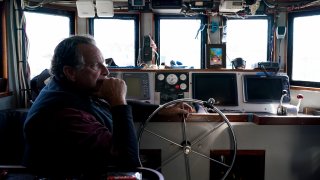
California officials want federal disaster aid for the state's salmon fishing industry, they said Friday following the closure of recreational and commercial king salmon fishing seasons along much of the West Coast due to near-record low numbers of the iconic fish returning to their spawning grounds.
Dealing a blow to the salmon fishing industry, the Pacific Fishery Management Council unanimously approved the closure Thursday for fall-run chinook fishing from Cape Falcon in northern Oregon to the California-Mexico border. Limited recreational salmon fishing will be allowed off southern Oregon in the fall.
Much of the salmon caught off Oregon originate in California’s Klamath and Sacramento rivers. After hatching in freshwater, they spend an average of three years maturing in the Pacific, where many are snagged by commercial fishermen, before migrating back to their spawning grounds, where conditions are more ideal to give birth. After laying eggs, they die.
“The forecasts for chinook returning to California rivers this year are near record lows,” Council Chair Marc Gorelnik said after the vote in a news release. “The poor conditions in the freshwater environment that contributed to these low forecasted returns are unfortunately not something that the Council can or has authority to control."
Get Boston local news, weather forecasts, lifestyle and entertainment stories to your inbox. Sign up for NBC Boston’s newsletters.
Biologists say the chinook population has declined dramatically after years of drought. Many in the fishing industry say a rollback of federal protections for endangered salmon under the Trump administration allowed more water to be diverted from the Sacramento River Basin to agriculture, causing even more harm.
“The fact is that just too many salmon eggs and juvenile salmon died in the rivers in 2020 as a direct result of politically driven, short-sighted water management policies, under the prior federal administration, to ‘maximize’ irrigation river water deliveries during a major drought," said Glen Spain, acting executive director of the Pacific Coast Federation of Fishermen’s Associations. “Unfortunately, this purely politically driven mistake will cost our fishing-dependent coastal communities dearly.”
California fishing industry representatives and elected leaders said federal aid must be released quickly and efforts need to be ramped up to restore salmon habitat in California rivers with better water management, and the removal of dams and other barriers.
U.S. & World
“We have to make sure that the policies and practices and the rest are not such that they are defying the evolutionary progress of salmon,” U.S. Rep. Nancy Pelosi said Friday, speaking in San Francisco in the rain, surrounded by fishers who spoke of their concerns about making ends meet during the closure.
The Democratic congresswoman, whose district includes the San Francisco Bay area, pledged to push for the Biden administration to act quickly on the state's request to declare the situation a fishery resource disaster, the first step toward a disaster assistance bill that must be approved by Congress.
In a letter to U.S. Secretary of Commerce Gina M. Raimondo seeking the declaration, the California governor's office stated that the projected loss of the 2023 season is over $45 million — and that does not include the full impact to coastal communities and inland salmon fisheries.
California’s salmon industry is valued at $1.4 billion in economic activity and 23,000 jobs annually in a normal season and contributes about $700 million to the economy and supports more than 10,000 jobs in Oregon, according to the Golden State Salmon Association.
“There's a lot of fear and panic all up and down the coast with families trying to figure out how they're going to pay the bills this year," said John McManus, the group’s senior policy director.
Experts fear native California salmon are in a spiral toward extinction. Already, California’s spring-run chinook are listed as threatened under the Endangered Species Act, while winter-run chinook are endangered along with the Central California Coast coho salmon, which has been off-limits to California commercial fishers since the 1990s.
Recreational fishing is expected to be allowed in Oregon only for coho salmon during the summer and for chinook after Sept. 1. Salmon season is expected to open as usual north of Cape Falcon, including in the Columbia River and off Washington’s coast.
There's some hope that the unusually wet winter in California, which has mostly freed the state of drought, will bring relief. An unprecedented series of powerful storms has replenished most of California’s reservoirs, dumping record amounts of rain and snow and busting a severe three-year drought. But too much water running through the rivers could also kill eggs and young hatchlings.
___
Baumann reported from Bellingham, Washington.



